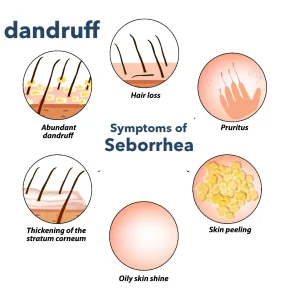Overview
Dandruff is a common, chronic scalp condition characterized by flaking of the skin on the scalp. It is not contagious or serious, but it can be persistent and sometimes embarrassing. Dandruff often appears as white or yellowish flakes on the scalp, hair, or shoulders and may be associated with itching. The condition can affect people of all ages and tends to recur over time.
Symptoms
Symptoms of dandruff are usually limited to the scalp but may vary in severity:
-
White or yellow flakes of dead skin on the scalp or hair
-
Flakes visible on shoulders or clothing
-
Itchy scalp
-
Dryness or tight feeling of the scalp
-
Mild redness or irritation in some cases
-
Symptoms that worsen during cold, dry weather or stress
Causes
Dandruff develops due to increased shedding of scalp skin cells, often influenced by multiple factors:
-
Overgrowth of Malassezia yeast on the scalp
-
Oily or irritated scalp
-
Dry skin, especially in colder climates
-
Infrequent shampooing leading to skin buildup
-
Sensitivity to hair care products
-
Skin conditions such as seborrheic dermatitis or psoriasis
-
Hormonal or immune system factors
Risk Factors
Certain factors increase the likelihood of developing dandruff:
-
Adolescence and adulthood
-
Male gender
-
Oily skin or scalp
-
Stress or fatigue
-
Cold, dry weather
-
Neurological conditions such as Parkinson’s disease
-
Weakened immune system
-
Poor scalp hygiene
Complications
Dandruff is usually harmless but may lead to complications if severe or untreated:
-
Persistent scalp itching and discomfort
-
Scalp redness or inflammation
-
Secondary skin infections from scratching
-
Hair shedding due to excessive scratching
-
Reduced self-confidence or social discomfort
Prevention
Dandruff cannot always be completely prevented, but its frequency and severity can be reduced:
-
Washing hair regularly with a suitable shampoo
-
Using anti-dandruff shampoos when needed
-
Avoiding excessive use of harsh hair products
-
Managing stress effectively
-
Keeping the scalp clean and well cared for
-
Seeking medical advice if dandruff is severe or persistent
Advertisement


